Property Law 1: Property Rights in the Australian Legal System
VerifiedAdded on 2022/10/09
|10
|2415
|41
Report
AI Summary
This report provides a detailed analysis of property rights within the Australian legal system. It begins by defining property and distinguishing between personal and real property, highlighting the concept of a 'bundle of rights.' The report explores the different forms property rights take under Australian law, including the distinction between land and goods and the recognition of native title. It examines the hierarchy of interests established by laws and courts of equity, discussing scenarios that affect priority, such as registered and unregistered interests, Torrens title, and fixtures. The report further addresses limitations on property rights, statutory restrictions, and liabilities related to property disputes, including the application of liability rules and the importance of efficient use of rights. The report then delves into remedies available to property owners, such as suing for trespass and damages. The report concludes with a discussion of the outcomes for Elsa, Anna, and Kristoff, analyzing their proprietary land interests and the impact of unregistered documents and constructive trusts, as well as the legal implications of Duke Weselton's actions. It also discusses the legal maxim ex turpi causa non-oritur action and the legal implications of all parties involved.
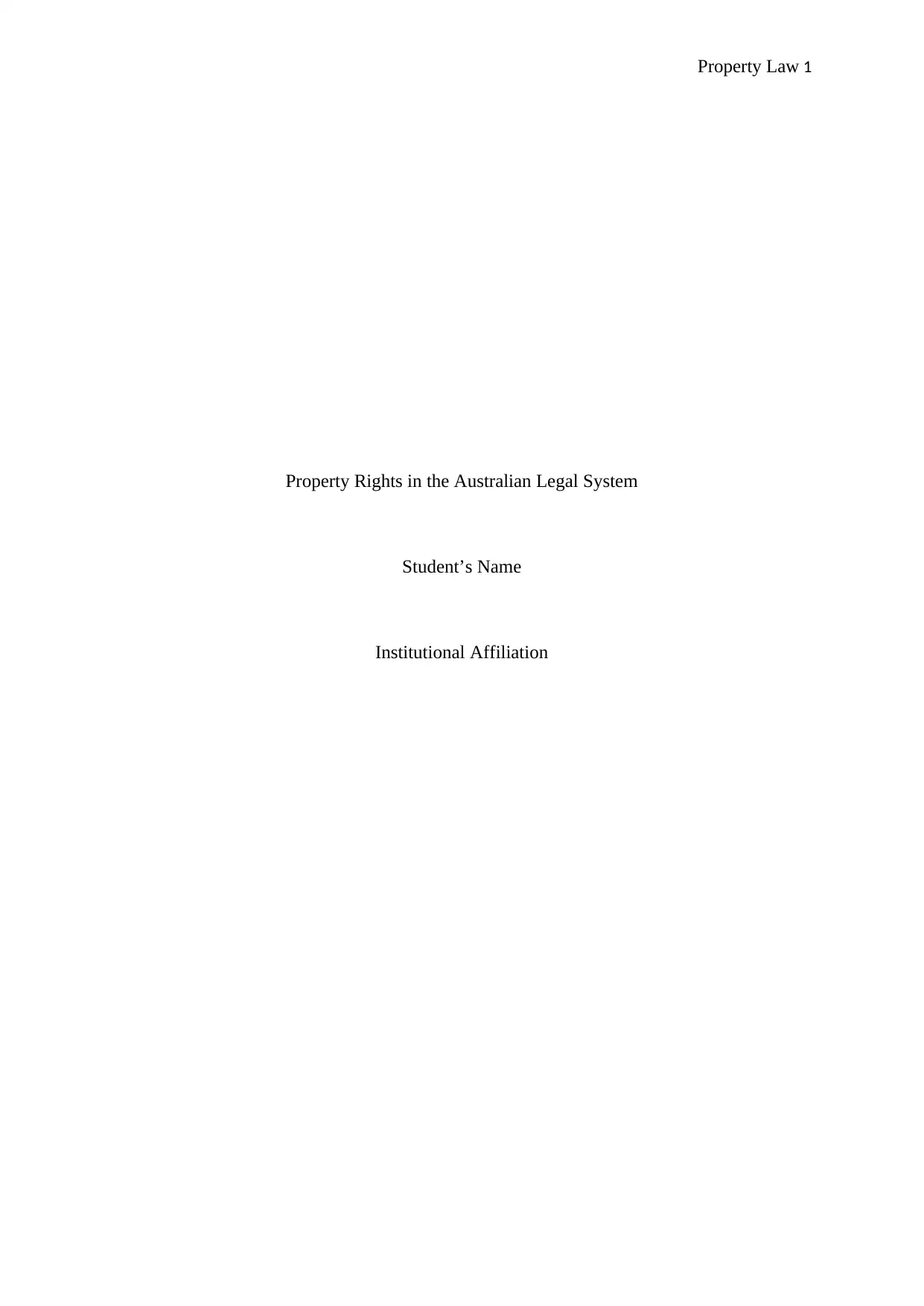
Property Law 1
Property Rights in the Australian Legal System
Student’s Name
Institutional Affiliation
Property Rights in the Australian Legal System
Student’s Name
Institutional Affiliation
Paraphrase This Document
Need a fresh take? Get an instant paraphrase of this document with our AI Paraphraser
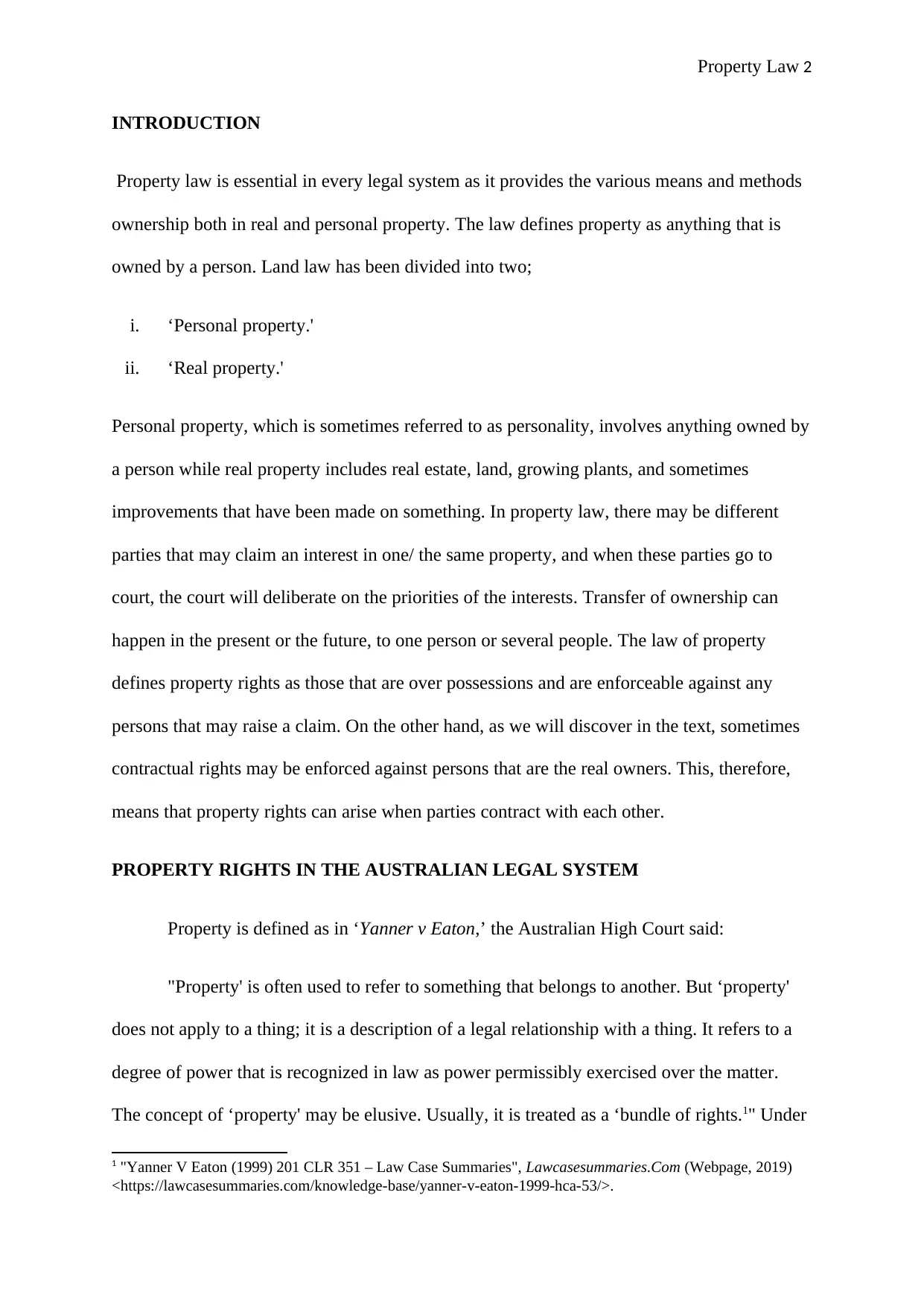
Property Law 2
INTRODUCTION
Property law is essential in every legal system as it provides the various means and methods
ownership both in real and personal property. The law defines property as anything that is
owned by a person. Land law has been divided into two;
i. ‘Personal property.'
ii. ‘Real property.'
Personal property, which is sometimes referred to as personality, involves anything owned by
a person while real property includes real estate, land, growing plants, and sometimes
improvements that have been made on something. In property law, there may be different
parties that may claim an interest in one/ the same property, and when these parties go to
court, the court will deliberate on the priorities of the interests. Transfer of ownership can
happen in the present or the future, to one person or several people. The law of property
defines property rights as those that are over possessions and are enforceable against any
persons that may raise a claim. On the other hand, as we will discover in the text, sometimes
contractual rights may be enforced against persons that are the real owners. This, therefore,
means that property rights can arise when parties contract with each other.
PROPERTY RIGHTS IN THE AUSTRALIAN LEGAL SYSTEM
Property is defined as in ‘Yanner v Eaton,’ the Australian High Court said:
"Property' is often used to refer to something that belongs to another. But ‘property'
does not apply to a thing; it is a description of a legal relationship with a thing. It refers to a
degree of power that is recognized in law as power permissibly exercised over the matter.
The concept of ‘property' may be elusive. Usually, it is treated as a ‘bundle of rights.1" Under
1 "Yanner V Eaton (1999) 201 CLR 351 – Law Case Summaries", Lawcasesummaries.Com (Webpage, 2019)
<https://lawcasesummaries.com/knowledge-base/yanner-v-eaton-1999-hca-53/>.
INTRODUCTION
Property law is essential in every legal system as it provides the various means and methods
ownership both in real and personal property. The law defines property as anything that is
owned by a person. Land law has been divided into two;
i. ‘Personal property.'
ii. ‘Real property.'
Personal property, which is sometimes referred to as personality, involves anything owned by
a person while real property includes real estate, land, growing plants, and sometimes
improvements that have been made on something. In property law, there may be different
parties that may claim an interest in one/ the same property, and when these parties go to
court, the court will deliberate on the priorities of the interests. Transfer of ownership can
happen in the present or the future, to one person or several people. The law of property
defines property rights as those that are over possessions and are enforceable against any
persons that may raise a claim. On the other hand, as we will discover in the text, sometimes
contractual rights may be enforced against persons that are the real owners. This, therefore,
means that property rights can arise when parties contract with each other.
PROPERTY RIGHTS IN THE AUSTRALIAN LEGAL SYSTEM
Property is defined as in ‘Yanner v Eaton,’ the Australian High Court said:
"Property' is often used to refer to something that belongs to another. But ‘property'
does not apply to a thing; it is a description of a legal relationship with a thing. It refers to a
degree of power that is recognized in law as power permissibly exercised over the matter.
The concept of ‘property' may be elusive. Usually, it is treated as a ‘bundle of rights.1" Under
1 "Yanner V Eaton (1999) 201 CLR 351 – Law Case Summaries", Lawcasesummaries.Com (Webpage, 2019)
<https://lawcasesummaries.com/knowledge-base/yanner-v-eaton-1999-hca-53/>.
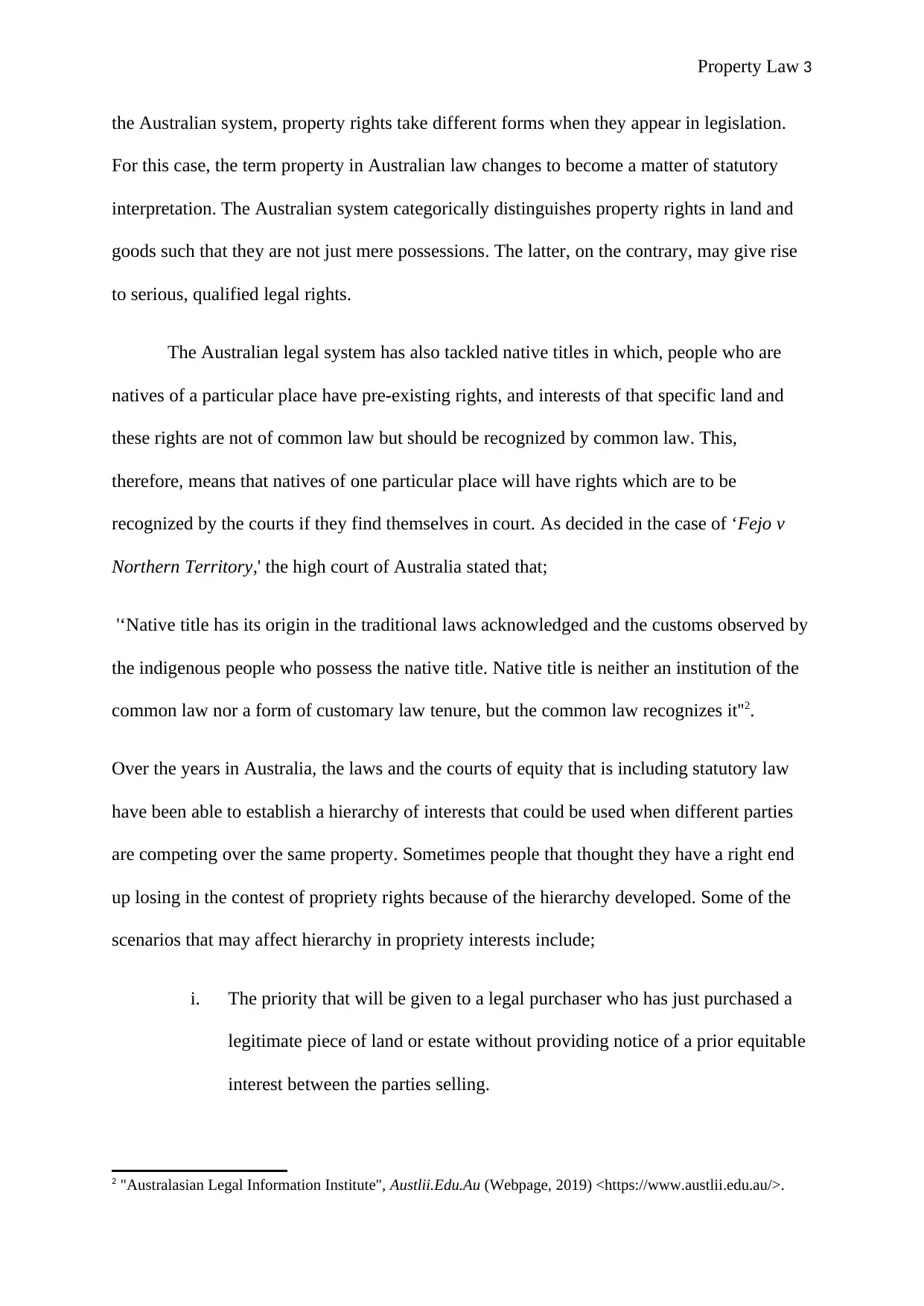
Property Law 3
the Australian system, property rights take different forms when they appear in legislation.
For this case, the term property in Australian law changes to become a matter of statutory
interpretation. The Australian system categorically distinguishes property rights in land and
goods such that they are not just mere possessions. The latter, on the contrary, may give rise
to serious, qualified legal rights.
The Australian legal system has also tackled native titles in which, people who are
natives of a particular place have pre-existing rights, and interests of that specific land and
these rights are not of common law but should be recognized by common law. This,
therefore, means that natives of one particular place will have rights which are to be
recognized by the courts if they find themselves in court. As decided in the case of ‘Fejo v
Northern Territory,' the high court of Australia stated that;
'‘Native title has its origin in the traditional laws acknowledged and the customs observed by
the indigenous people who possess the native title. Native title is neither an institution of the
common law nor a form of customary law tenure, but the common law recognizes it''2.
Over the years in Australia, the laws and the courts of equity that is including statutory law
have been able to establish a hierarchy of interests that could be used when different parties
are competing over the same property. Sometimes people that thought they have a right end
up losing in the contest of propriety rights because of the hierarchy developed. Some of the
scenarios that may affect hierarchy in propriety interests include;
i. The priority that will be given to a legal purchaser who has just purchased a
legitimate piece of land or estate without providing notice of a prior equitable
interest between the parties selling.
2 "Australasian Legal Information Institute", Austlii.Edu.Au (Webpage, 2019) <https://www.austlii.edu.au/>.
the Australian system, property rights take different forms when they appear in legislation.
For this case, the term property in Australian law changes to become a matter of statutory
interpretation. The Australian system categorically distinguishes property rights in land and
goods such that they are not just mere possessions. The latter, on the contrary, may give rise
to serious, qualified legal rights.
The Australian legal system has also tackled native titles in which, people who are
natives of a particular place have pre-existing rights, and interests of that specific land and
these rights are not of common law but should be recognized by common law. This,
therefore, means that natives of one particular place will have rights which are to be
recognized by the courts if they find themselves in court. As decided in the case of ‘Fejo v
Northern Territory,' the high court of Australia stated that;
'‘Native title has its origin in the traditional laws acknowledged and the customs observed by
the indigenous people who possess the native title. Native title is neither an institution of the
common law nor a form of customary law tenure, but the common law recognizes it''2.
Over the years in Australia, the laws and the courts of equity that is including statutory law
have been able to establish a hierarchy of interests that could be used when different parties
are competing over the same property. Sometimes people that thought they have a right end
up losing in the contest of propriety rights because of the hierarchy developed. Some of the
scenarios that may affect hierarchy in propriety interests include;
i. The priority that will be given to a legal purchaser who has just purchased a
legitimate piece of land or estate without providing notice of a prior equitable
interest between the parties selling.
2 "Australasian Legal Information Institute", Austlii.Edu.Au (Webpage, 2019) <https://www.austlii.edu.au/>.
⊘ This is a preview!⊘
Do you want full access?
Subscribe today to unlock all pages.

Trusted by 1+ million students worldwide
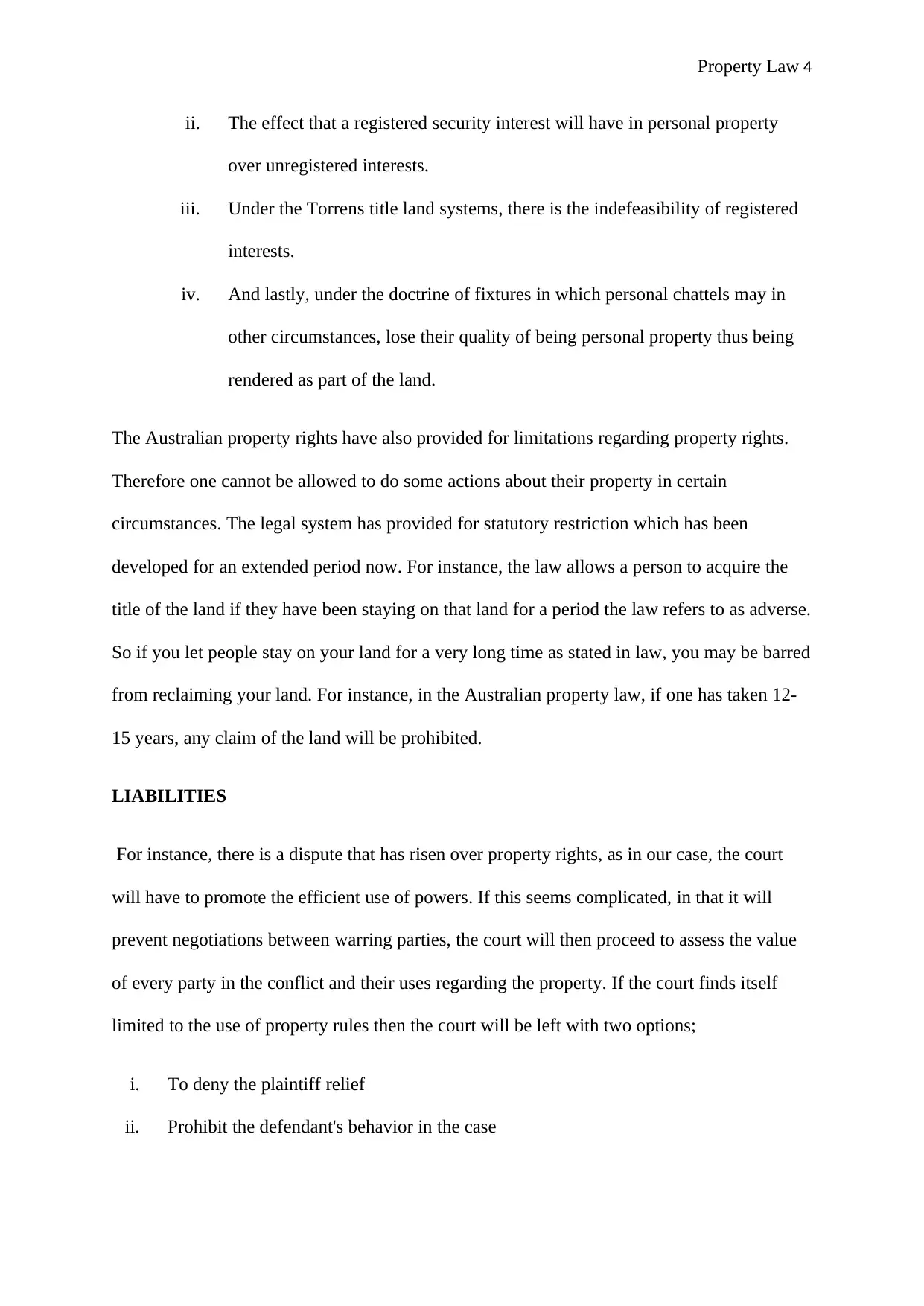
Property Law 4
ii. The effect that a registered security interest will have in personal property
over unregistered interests.
iii. Under the Torrens title land systems, there is the indefeasibility of registered
interests.
iv. And lastly, under the doctrine of fixtures in which personal chattels may in
other circumstances, lose their quality of being personal property thus being
rendered as part of the land.
The Australian property rights have also provided for limitations regarding property rights.
Therefore one cannot be allowed to do some actions about their property in certain
circumstances. The legal system has provided for statutory restriction which has been
developed for an extended period now. For instance, the law allows a person to acquire the
title of the land if they have been staying on that land for a period the law refers to as adverse.
So if you let people stay on your land for a very long time as stated in law, you may be barred
from reclaiming your land. For instance, in the Australian property law, if one has taken 12-
15 years, any claim of the land will be prohibited.
LIABILITIES
For instance, there is a dispute that has risen over property rights, as in our case, the court
will have to promote the efficient use of powers. If this seems complicated, in that it will
prevent negotiations between warring parties, the court will then proceed to assess the value
of every party in the conflict and their uses regarding the property. If the court finds itself
limited to the use of property rules then the court will be left with two options;
i. To deny the plaintiff relief
ii. Prohibit the defendant's behavior in the case
ii. The effect that a registered security interest will have in personal property
over unregistered interests.
iii. Under the Torrens title land systems, there is the indefeasibility of registered
interests.
iv. And lastly, under the doctrine of fixtures in which personal chattels may in
other circumstances, lose their quality of being personal property thus being
rendered as part of the land.
The Australian property rights have also provided for limitations regarding property rights.
Therefore one cannot be allowed to do some actions about their property in certain
circumstances. The legal system has provided for statutory restriction which has been
developed for an extended period now. For instance, the law allows a person to acquire the
title of the land if they have been staying on that land for a period the law refers to as adverse.
So if you let people stay on your land for a very long time as stated in law, you may be barred
from reclaiming your land. For instance, in the Australian property law, if one has taken 12-
15 years, any claim of the land will be prohibited.
LIABILITIES
For instance, there is a dispute that has risen over property rights, as in our case, the court
will have to promote the efficient use of powers. If this seems complicated, in that it will
prevent negotiations between warring parties, the court will then proceed to assess the value
of every party in the conflict and their uses regarding the property. If the court finds itself
limited to the use of property rules then the court will be left with two options;
i. To deny the plaintiff relief
ii. Prohibit the defendant's behavior in the case
Paraphrase This Document
Need a fresh take? Get an instant paraphrase of this document with our AI Paraphraser
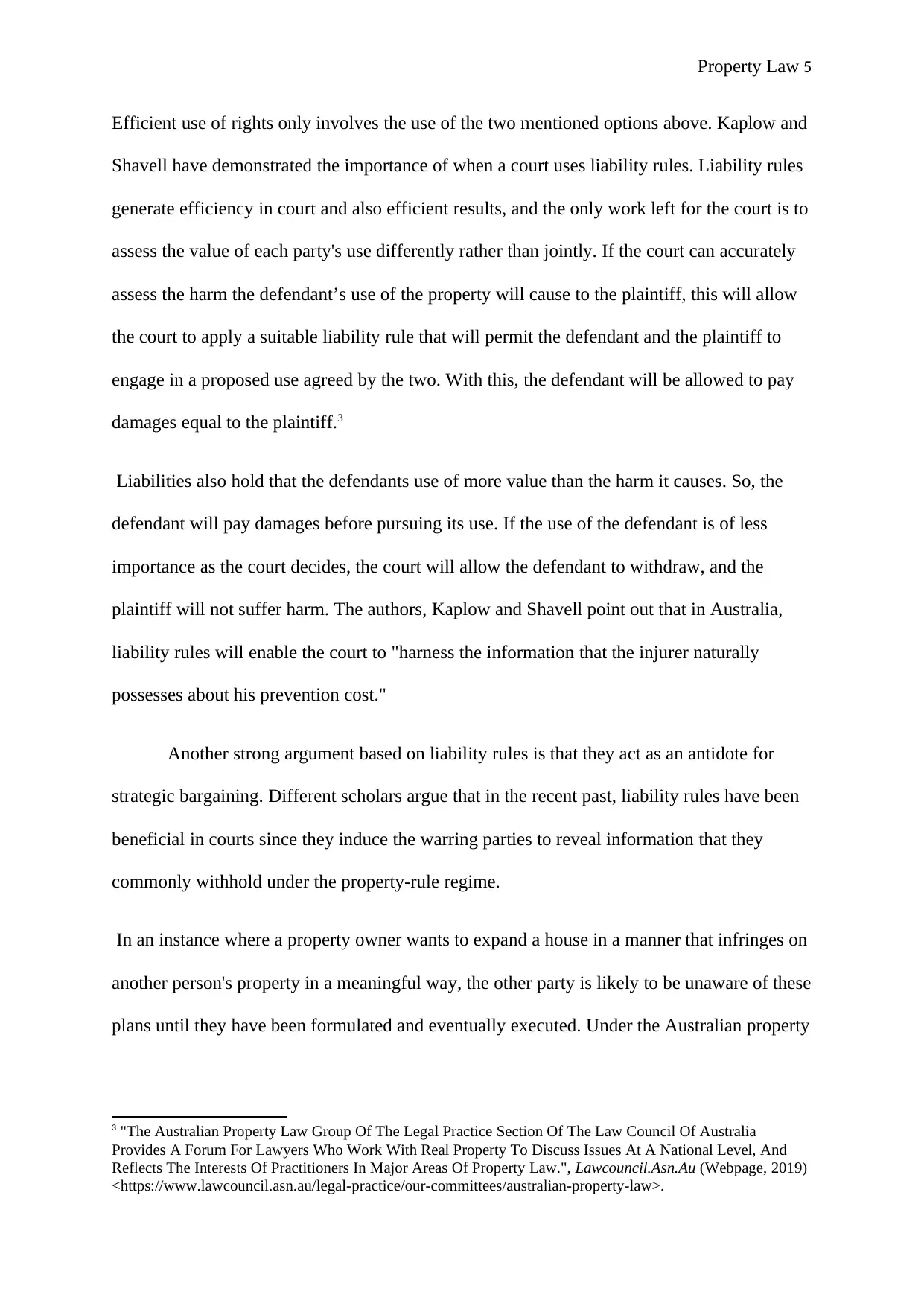
Property Law 5
Efficient use of rights only involves the use of the two mentioned options above. Kaplow and
Shavell have demonstrated the importance of when a court uses liability rules. Liability rules
generate efficiency in court and also efficient results, and the only work left for the court is to
assess the value of each party's use differently rather than jointly. If the court can accurately
assess the harm the defendant’s use of the property will cause to the plaintiff, this will allow
the court to apply a suitable liability rule that will permit the defendant and the plaintiff to
engage in a proposed use agreed by the two. With this, the defendant will be allowed to pay
damages equal to the plaintiff.3
Liabilities also hold that the defendants use of more value than the harm it causes. So, the
defendant will pay damages before pursuing its use. If the use of the defendant is of less
importance as the court decides, the court will allow the defendant to withdraw, and the
plaintiff will not suffer harm. The authors, Kaplow and Shavell point out that in Australia,
liability rules will enable the court to "harness the information that the injurer naturally
possesses about his prevention cost."
Another strong argument based on liability rules is that they act as an antidote for
strategic bargaining. Different scholars argue that in the recent past, liability rules have been
beneficial in courts since they induce the warring parties to reveal information that they
commonly withhold under the property-rule regime.
In an instance where a property owner wants to expand a house in a manner that infringes on
another person's property in a meaningful way, the other party is likely to be unaware of these
plans until they have been formulated and eventually executed. Under the Australian property
3 "The Australian Property Law Group Of The Legal Practice Section Of The Law Council Of Australia
Provides A Forum For Lawyers Who Work With Real Property To Discuss Issues At A National Level, And
Reflects The Interests Of Practitioners In Major Areas Of Property Law.", Lawcouncil.Asn.Au (Webpage, 2019)
<https://www.lawcouncil.asn.au/legal-practice/our-committees/australian-property-law>.
Efficient use of rights only involves the use of the two mentioned options above. Kaplow and
Shavell have demonstrated the importance of when a court uses liability rules. Liability rules
generate efficiency in court and also efficient results, and the only work left for the court is to
assess the value of each party's use differently rather than jointly. If the court can accurately
assess the harm the defendant’s use of the property will cause to the plaintiff, this will allow
the court to apply a suitable liability rule that will permit the defendant and the plaintiff to
engage in a proposed use agreed by the two. With this, the defendant will be allowed to pay
damages equal to the plaintiff.3
Liabilities also hold that the defendants use of more value than the harm it causes. So, the
defendant will pay damages before pursuing its use. If the use of the defendant is of less
importance as the court decides, the court will allow the defendant to withdraw, and the
plaintiff will not suffer harm. The authors, Kaplow and Shavell point out that in Australia,
liability rules will enable the court to "harness the information that the injurer naturally
possesses about his prevention cost."
Another strong argument based on liability rules is that they act as an antidote for
strategic bargaining. Different scholars argue that in the recent past, liability rules have been
beneficial in courts since they induce the warring parties to reveal information that they
commonly withhold under the property-rule regime.
In an instance where a property owner wants to expand a house in a manner that infringes on
another person's property in a meaningful way, the other party is likely to be unaware of these
plans until they have been formulated and eventually executed. Under the Australian property
3 "The Australian Property Law Group Of The Legal Practice Section Of The Law Council Of Australia
Provides A Forum For Lawyers Who Work With Real Property To Discuss Issues At A National Level, And
Reflects The Interests Of Practitioners In Major Areas Of Property Law.", Lawcouncil.Asn.Au (Webpage, 2019)
<https://www.lawcouncil.asn.au/legal-practice/our-committees/australian-property-law>.
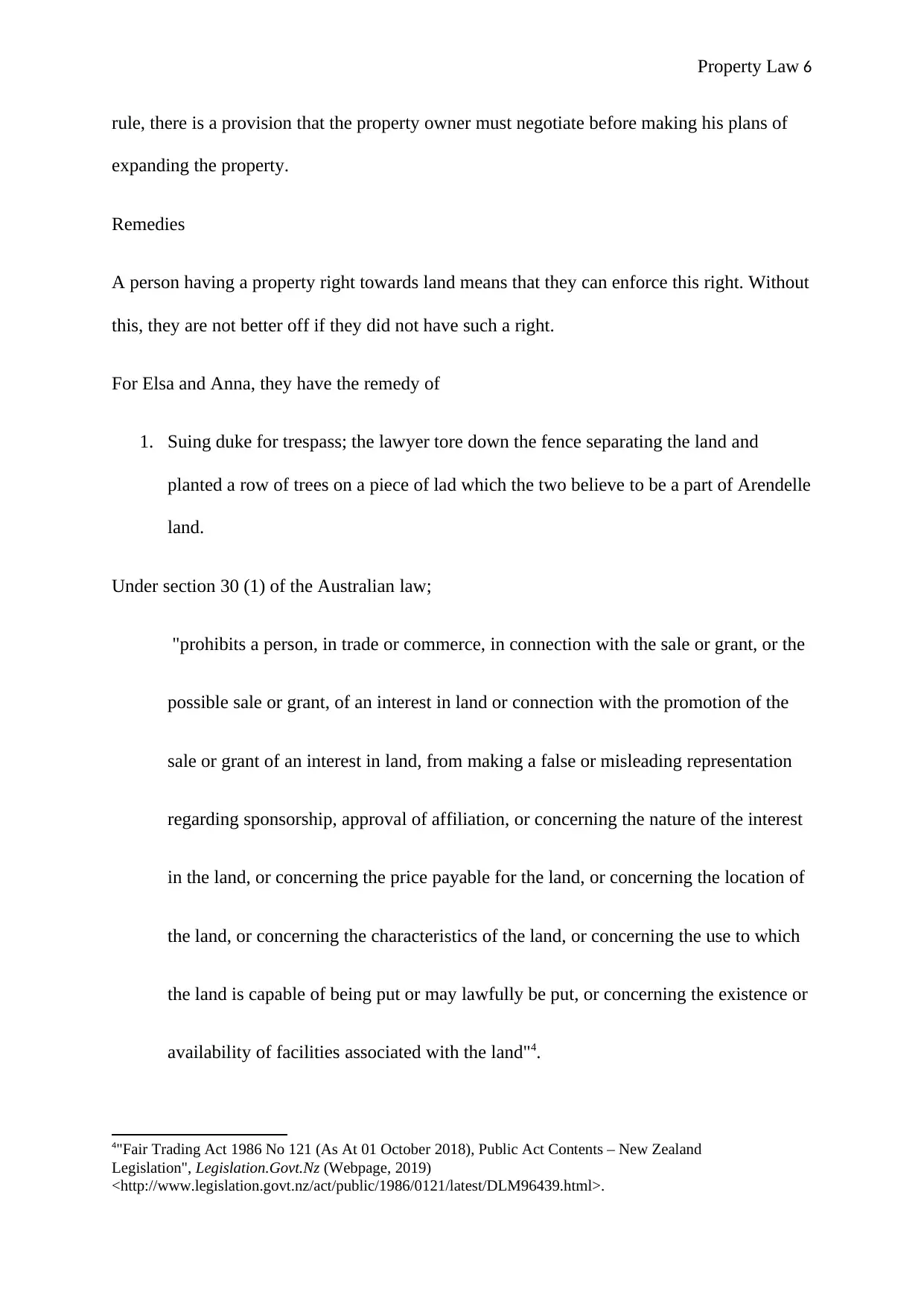
Property Law 6
rule, there is a provision that the property owner must negotiate before making his plans of
expanding the property.
Remedies
A person having a property right towards land means that they can enforce this right. Without
this, they are not better off if they did not have such a right.
For Elsa and Anna, they have the remedy of
1. Suing duke for trespass; the lawyer tore down the fence separating the land and
planted a row of trees on a piece of lad which the two believe to be a part of Arendelle
land.
Under section 30 (1) of the Australian law;
"prohibits a person, in trade or commerce, in connection with the sale or grant, or the
possible sale or grant, of an interest in land or connection with the promotion of the
sale or grant of an interest in land, from making a false or misleading representation
regarding sponsorship, approval of affiliation, or concerning the nature of the interest
in the land, or concerning the price payable for the land, or concerning the location of
the land, or concerning the characteristics of the land, or concerning the use to which
the land is capable of being put or may lawfully be put, or concerning the existence or
availability of facilities associated with the land"4.
4"Fair Trading Act 1986 No 121 (As At 01 October 2018), Public Act Contents – New Zealand
Legislation", Legislation.Govt.Nz (Webpage, 2019)
<http://www.legislation.govt.nz/act/public/1986/0121/latest/DLM96439.html>.
rule, there is a provision that the property owner must negotiate before making his plans of
expanding the property.
Remedies
A person having a property right towards land means that they can enforce this right. Without
this, they are not better off if they did not have such a right.
For Elsa and Anna, they have the remedy of
1. Suing duke for trespass; the lawyer tore down the fence separating the land and
planted a row of trees on a piece of lad which the two believe to be a part of Arendelle
land.
Under section 30 (1) of the Australian law;
"prohibits a person, in trade or commerce, in connection with the sale or grant, or the
possible sale or grant, of an interest in land or connection with the promotion of the
sale or grant of an interest in land, from making a false or misleading representation
regarding sponsorship, approval of affiliation, or concerning the nature of the interest
in the land, or concerning the price payable for the land, or concerning the location of
the land, or concerning the characteristics of the land, or concerning the use to which
the land is capable of being put or may lawfully be put, or concerning the existence or
availability of facilities associated with the land"4.
4"Fair Trading Act 1986 No 121 (As At 01 October 2018), Public Act Contents – New Zealand
Legislation", Legislation.Govt.Nz (Webpage, 2019)
<http://www.legislation.govt.nz/act/public/1986/0121/latest/DLM96439.html>.
⊘ This is a preview!⊘
Do you want full access?
Subscribe today to unlock all pages.

Trusted by 1+ million students worldwide
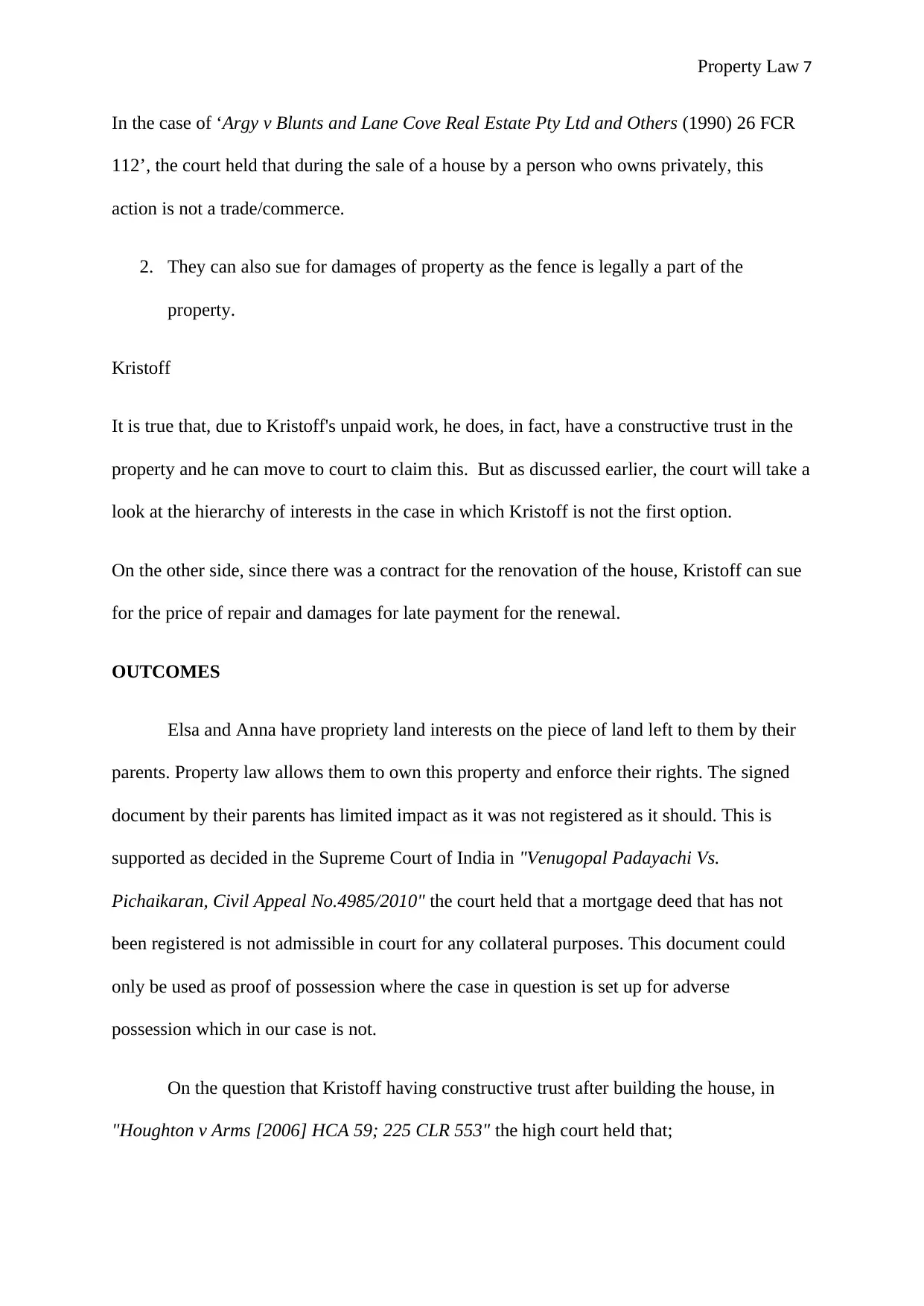
Property Law 7
In the case of ‘Argy v Blunts and Lane Cove Real Estate Pty Ltd and Others (1990) 26 FCR
112’, the court held that during the sale of a house by a person who owns privately, this
action is not a trade/commerce.
2. They can also sue for damages of property as the fence is legally a part of the
property.
Kristoff
It is true that, due to Kristoff's unpaid work, he does, in fact, have a constructive trust in the
property and he can move to court to claim this. But as discussed earlier, the court will take a
look at the hierarchy of interests in the case in which Kristoff is not the first option.
On the other side, since there was a contract for the renovation of the house, Kristoff can sue
for the price of repair and damages for late payment for the renewal.
OUTCOMES
Elsa and Anna have propriety land interests on the piece of land left to them by their
parents. Property law allows them to own this property and enforce their rights. The signed
document by their parents has limited impact as it was not registered as it should. This is
supported as decided in the Supreme Court of India in "Venugopal Padayachi Vs.
Pichaikaran, Civil Appeal No.4985/2010" the court held that a mortgage deed that has not
been registered is not admissible in court for any collateral purposes. This document could
only be used as proof of possession where the case in question is set up for adverse
possession which in our case is not.
On the question that Kristoff having constructive trust after building the house, in
"Houghton v Arms [2006] HCA 59; 225 CLR 553" the high court held that;
In the case of ‘Argy v Blunts and Lane Cove Real Estate Pty Ltd and Others (1990) 26 FCR
112’, the court held that during the sale of a house by a person who owns privately, this
action is not a trade/commerce.
2. They can also sue for damages of property as the fence is legally a part of the
property.
Kristoff
It is true that, due to Kristoff's unpaid work, he does, in fact, have a constructive trust in the
property and he can move to court to claim this. But as discussed earlier, the court will take a
look at the hierarchy of interests in the case in which Kristoff is not the first option.
On the other side, since there was a contract for the renovation of the house, Kristoff can sue
for the price of repair and damages for late payment for the renewal.
OUTCOMES
Elsa and Anna have propriety land interests on the piece of land left to them by their
parents. Property law allows them to own this property and enforce their rights. The signed
document by their parents has limited impact as it was not registered as it should. This is
supported as decided in the Supreme Court of India in "Venugopal Padayachi Vs.
Pichaikaran, Civil Appeal No.4985/2010" the court held that a mortgage deed that has not
been registered is not admissible in court for any collateral purposes. This document could
only be used as proof of possession where the case in question is set up for adverse
possession which in our case is not.
On the question that Kristoff having constructive trust after building the house, in
"Houghton v Arms [2006] HCA 59; 225 CLR 553" the high court held that;
Paraphrase This Document
Need a fresh take? Get an instant paraphrase of this document with our AI Paraphraser
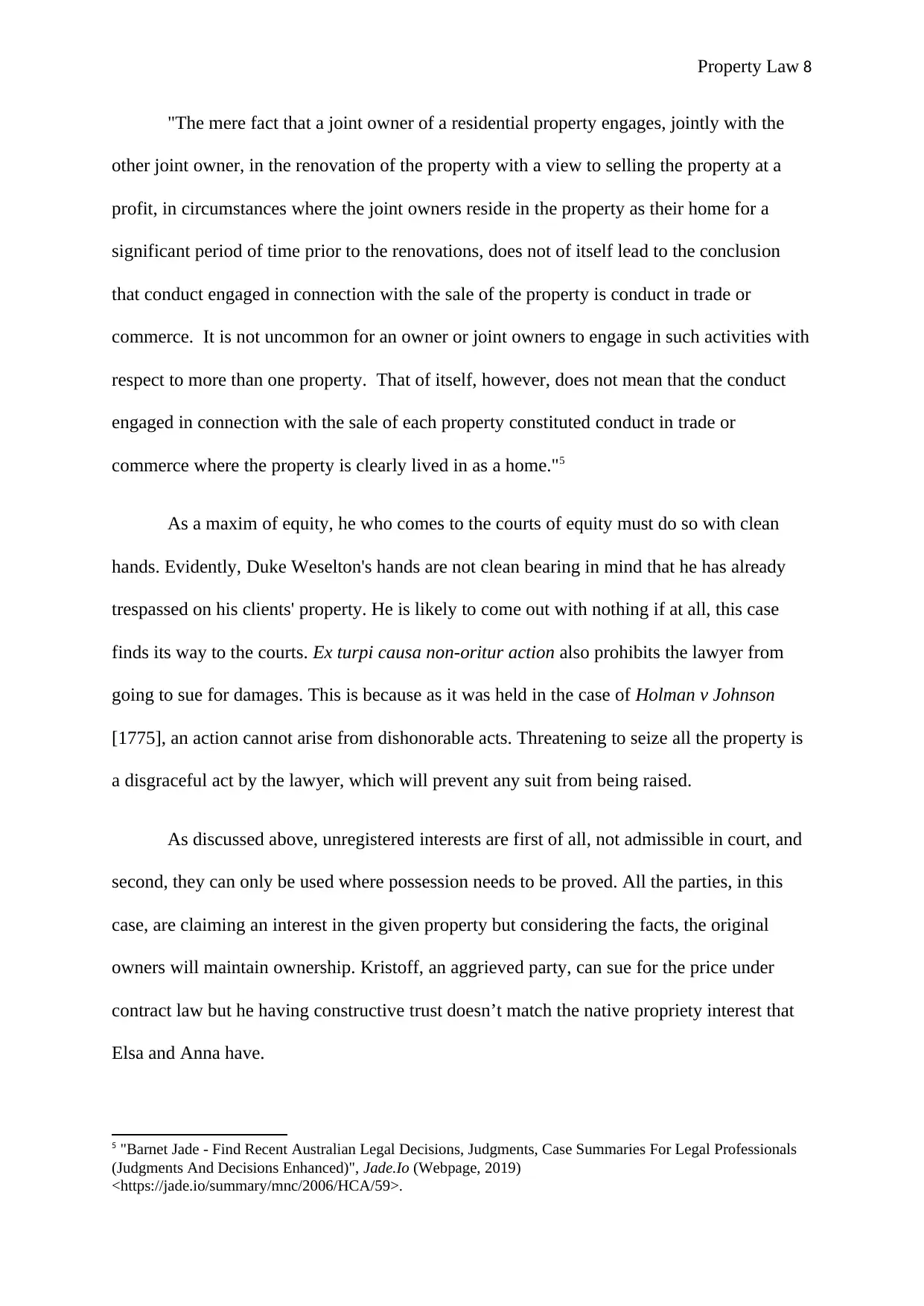
Property Law 8
"The mere fact that a joint owner of a residential property engages, jointly with the
other joint owner, in the renovation of the property with a view to selling the property at a
profit, in circumstances where the joint owners reside in the property as their home for a
significant period of time prior to the renovations, does not of itself lead to the conclusion
that conduct engaged in connection with the sale of the property is conduct in trade or
commerce. It is not uncommon for an owner or joint owners to engage in such activities with
respect to more than one property. That of itself, however, does not mean that the conduct
engaged in connection with the sale of each property constituted conduct in trade or
commerce where the property is clearly lived in as a home."5
As a maxim of equity, he who comes to the courts of equity must do so with clean
hands. Evidently, Duke Weselton's hands are not clean bearing in mind that he has already
trespassed on his clients' property. He is likely to come out with nothing if at all, this case
finds its way to the courts. Ex turpi causa non-oritur action also prohibits the lawyer from
going to sue for damages. This is because as it was held in the case of Holman v Johnson
[1775], an action cannot arise from dishonorable acts. Threatening to seize all the property is
a disgraceful act by the lawyer, which will prevent any suit from being raised.
As discussed above, unregistered interests are first of all, not admissible in court, and
second, they can only be used where possession needs to be proved. All the parties, in this
case, are claiming an interest in the given property but considering the facts, the original
owners will maintain ownership. Kristoff, an aggrieved party, can sue for the price under
contract law but he having constructive trust doesn’t match the native propriety interest that
Elsa and Anna have.
5 "Barnet Jade - Find Recent Australian Legal Decisions, Judgments, Case Summaries For Legal Professionals
(Judgments And Decisions Enhanced)", Jade.Io (Webpage, 2019)
<https://jade.io/summary/mnc/2006/HCA/59>.
"The mere fact that a joint owner of a residential property engages, jointly with the
other joint owner, in the renovation of the property with a view to selling the property at a
profit, in circumstances where the joint owners reside in the property as their home for a
significant period of time prior to the renovations, does not of itself lead to the conclusion
that conduct engaged in connection with the sale of the property is conduct in trade or
commerce. It is not uncommon for an owner or joint owners to engage in such activities with
respect to more than one property. That of itself, however, does not mean that the conduct
engaged in connection with the sale of each property constituted conduct in trade or
commerce where the property is clearly lived in as a home."5
As a maxim of equity, he who comes to the courts of equity must do so with clean
hands. Evidently, Duke Weselton's hands are not clean bearing in mind that he has already
trespassed on his clients' property. He is likely to come out with nothing if at all, this case
finds its way to the courts. Ex turpi causa non-oritur action also prohibits the lawyer from
going to sue for damages. This is because as it was held in the case of Holman v Johnson
[1775], an action cannot arise from dishonorable acts. Threatening to seize all the property is
a disgraceful act by the lawyer, which will prevent any suit from being raised.
As discussed above, unregistered interests are first of all, not admissible in court, and
second, they can only be used where possession needs to be proved. All the parties, in this
case, are claiming an interest in the given property but considering the facts, the original
owners will maintain ownership. Kristoff, an aggrieved party, can sue for the price under
contract law but he having constructive trust doesn’t match the native propriety interest that
Elsa and Anna have.
5 "Barnet Jade - Find Recent Australian Legal Decisions, Judgments, Case Summaries For Legal Professionals
(Judgments And Decisions Enhanced)", Jade.Io (Webpage, 2019)
<https://jade.io/summary/mnc/2006/HCA/59>.

Property Law 9
⊘ This is a preview!⊘
Do you want full access?
Subscribe today to unlock all pages.

Trusted by 1+ million students worldwide
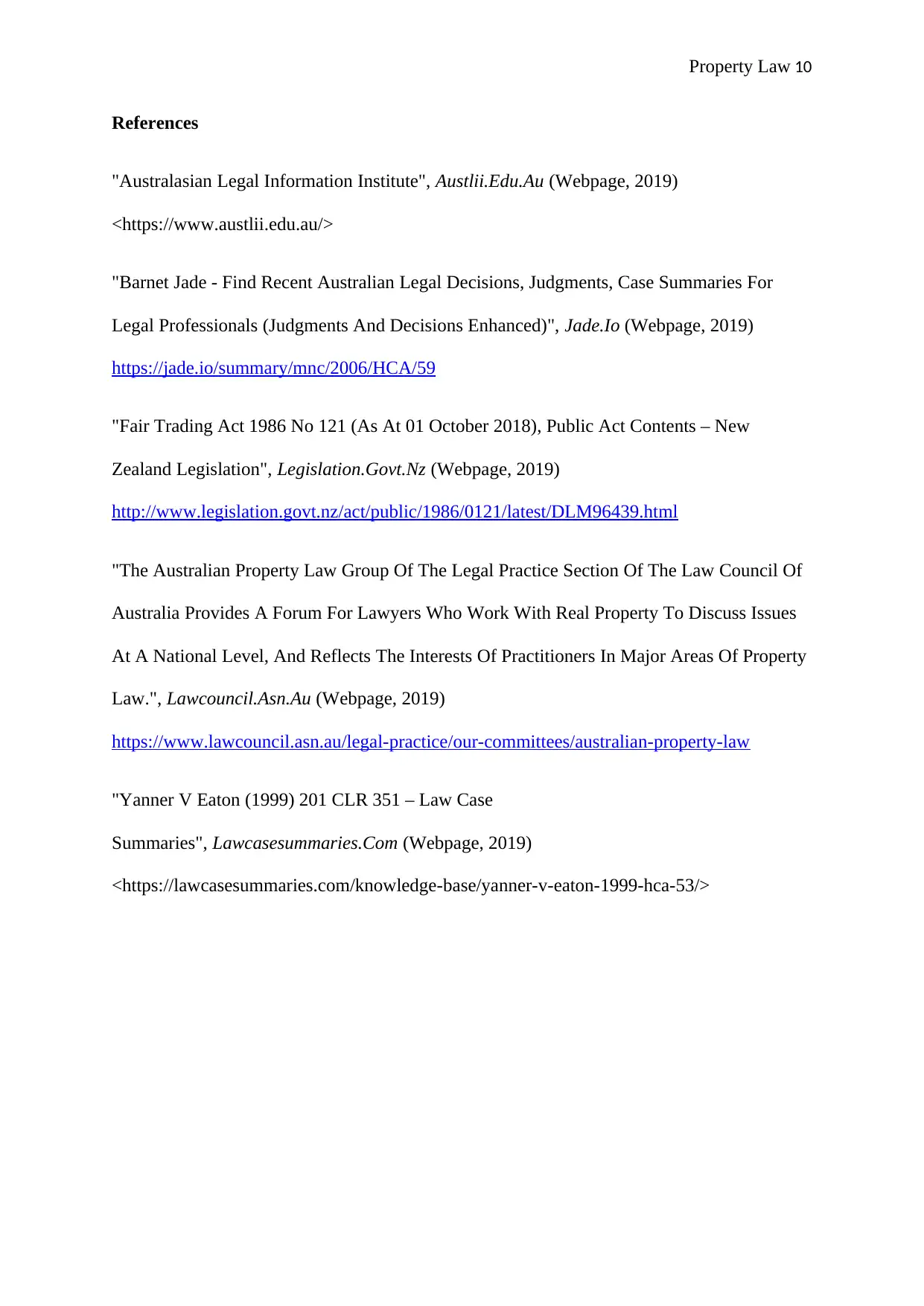
Property Law 10
References
"Australasian Legal Information Institute", Austlii.Edu.Au (Webpage, 2019)
<https://www.austlii.edu.au/>
"Barnet Jade - Find Recent Australian Legal Decisions, Judgments, Case Summaries For
Legal Professionals (Judgments And Decisions Enhanced)", Jade.Io (Webpage, 2019)
https://jade.io/summary/mnc/2006/HCA/59
"Fair Trading Act 1986 No 121 (As At 01 October 2018), Public Act Contents – New
Zealand Legislation", Legislation.Govt.Nz (Webpage, 2019)
http://www.legislation.govt.nz/act/public/1986/0121/latest/DLM96439.html
"The Australian Property Law Group Of The Legal Practice Section Of The Law Council Of
Australia Provides A Forum For Lawyers Who Work With Real Property To Discuss Issues
At A National Level, And Reflects The Interests Of Practitioners In Major Areas Of Property
Law.", Lawcouncil.Asn.Au (Webpage, 2019)
https://www.lawcouncil.asn.au/legal-practice/our-committees/australian-property-law
"Yanner V Eaton (1999) 201 CLR 351 – Law Case
Summaries", Lawcasesummaries.Com (Webpage, 2019)
<https://lawcasesummaries.com/knowledge-base/yanner-v-eaton-1999-hca-53/>
References
"Australasian Legal Information Institute", Austlii.Edu.Au (Webpage, 2019)
<https://www.austlii.edu.au/>
"Barnet Jade - Find Recent Australian Legal Decisions, Judgments, Case Summaries For
Legal Professionals (Judgments And Decisions Enhanced)", Jade.Io (Webpage, 2019)
https://jade.io/summary/mnc/2006/HCA/59
"Fair Trading Act 1986 No 121 (As At 01 October 2018), Public Act Contents – New
Zealand Legislation", Legislation.Govt.Nz (Webpage, 2019)
http://www.legislation.govt.nz/act/public/1986/0121/latest/DLM96439.html
"The Australian Property Law Group Of The Legal Practice Section Of The Law Council Of
Australia Provides A Forum For Lawyers Who Work With Real Property To Discuss Issues
At A National Level, And Reflects The Interests Of Practitioners In Major Areas Of Property
Law.", Lawcouncil.Asn.Au (Webpage, 2019)
https://www.lawcouncil.asn.au/legal-practice/our-committees/australian-property-law
"Yanner V Eaton (1999) 201 CLR 351 – Law Case
Summaries", Lawcasesummaries.Com (Webpage, 2019)
<https://lawcasesummaries.com/knowledge-base/yanner-v-eaton-1999-hca-53/>
1 out of 10
Related Documents
Your All-in-One AI-Powered Toolkit for Academic Success.
+13062052269
info@desklib.com
Available 24*7 on WhatsApp / Email
![[object Object]](/_next/static/media/star-bottom.7253800d.svg)
Unlock your academic potential
Copyright © 2020–2025 A2Z Services. All Rights Reserved. Developed and managed by ZUCOL.




![Mabo Case [No.2]: Analyzing Impact on Australian Legal System](/_next/image/?url=https%3A%2F%2Fdesklib.com%2Fmedia%2Fmabo-case-impact-australian-legal-system_page_2.jpg&w=256&q=75)